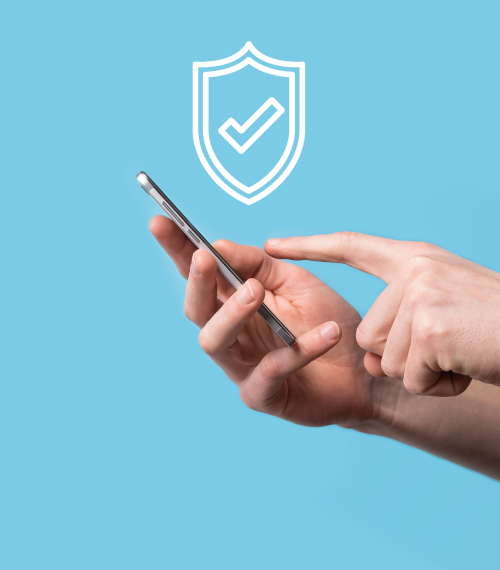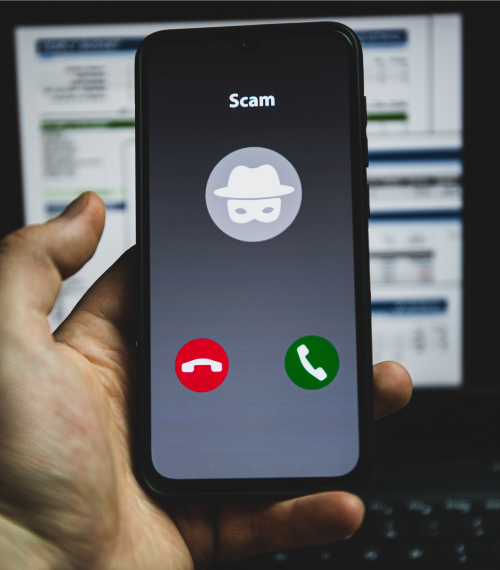
An extra set of eyes always sees more.
Stay Scam Aware
Watch our informative video that sheds light on a common scam involving Zelle. Knowledge is the first line of defense, and our video aims to arm you with the insights needed to recognize and avoid such fraudulent activities. Remember, awareness is your greatest shield against scams.

Your Shield Against Scams
- Two Factor Authentication
- Fraud Monitoring and Detection
- Account, Transfer, and Card Alerts
- Security & Fraud Prevention Articles

Fraud Prevention
The best way to avoid being scammed is to always keep your guard up. See our tips
for fraud prevention below.
Don’t respond: If you aren’t familiar with the source of a call, email or text, hang up the phone, don’t click on the link in the email and don’t reply to the text message.
Don’t trust caller ID or answer phone calls from unknown numbers: Even if you recognize the caller ID but the call seems suspicious, hang up the phone. Phone numbers can be easily spoofed to appear as if they are from a legitimate caller.
Don’t give out your information: Never provide any personally identifiable information unless you’re absolutely certain the person and reason are legitimate. Remember: Credit Union of Texas will never ask you to send us personal information such as an account number, online banking username, Social Security number, or Tax ID over text, email, or online.
Validate the request: If the individual or organization seems suspicious, make sure the request being made is legitimate by hanging up and calling the organization through an official number from their website.

Common Scams and Red Flags
Scams have become more and more common with the advancement of technology. Most often, scam artists will target you through fraudulent emails, text messages, and phone calls. Watch out for these common scams:
If you authorize a transfer or send money to a scammer, there's often little that can be done to help get your money back.

Understanding Malware and Protecting Yourself from It
Malware (malicious software) is a software designed to harm, exploit, or otherwise compromise a computer, network, or device. It comes in many forms, including viruses, worms, Trojans, ransomware, spyware, and adware. Malware can enter your system through infected email attachments, malicious websites, compromised software downloads, or even fake pop-ups urging you to click. Once installed, it can perform a range of harmful activities, from stealing your login credentials and financial information to locking you out of your files and demanding a ransom.
To protect yourself and your finances, it's essential to take proactive steps:
- Use Reliable Security Software: Install antivirus and anti-malware programs from trusted vendors and keep them updated regularly.
- Keep Your System Updated: Operating systems, browsers, and apps often release security patches to fix vulnerabilities. Enable automatic updates to ensure you're always protected.
- Be Wary of Phishing Attempts: Don’t open emails or messages from unknown sources, especially those asking for personal or financial information. Avoid clicking suspicious links or downloading unexpected attachments.
- Use Strong, Unique Passwords: Protect your online accounts with complex passwords. Enable two-factor authentication whenever possible.
- Back Up Your Data: Regular backups of important files (on external drives or cloud services) can be a lifesaver if your system is ever infected by ransomware.
- Be Cautious with Public Wi-Fi: Avoid accessing sensitive information (like banking or shopping accounts) over public Wi-Fi.
How can I help protect my accounts?
How can I protect my identity?
If you've been the victim of identity theft, we're here to help. If you have a credit or debit card with us, we'll cancel your card and issue a replacement immediately (you won’t be liable for any fraudulent activity).
How can I protect my computer?
How can I protect my smartphone?
What do I do if my identity has been compromised?

Banking Made Easier
Download the all-new CUTXMOBILE app to manage your finances at your convenience. Breeze through payments, transfers, and check deposits with just a few taps. Quickly sign-in using a 4-digit passcode. Apply for a credit card, a personal loan, or membership, or find your closest ATM or branch.



